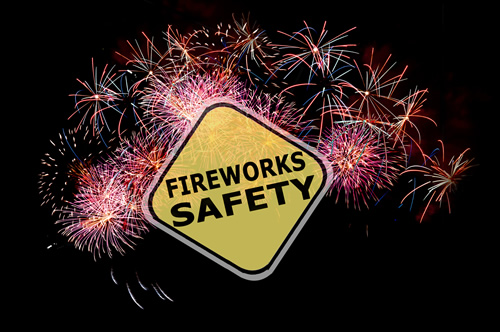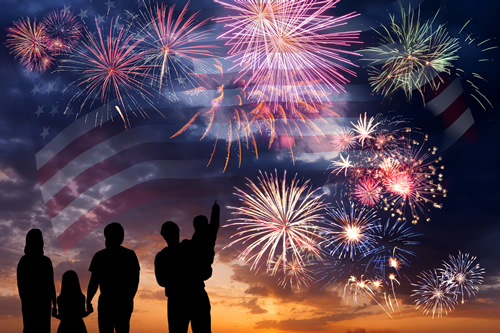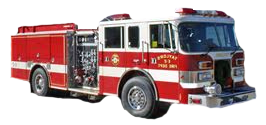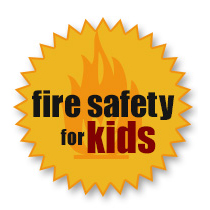Fire Safety – Fireworks
 EACH JULY 4TH AND NEW YEAR’S EVE THOUSANDS OF PEOPLE, MOST OFTEN CHILDREN AND TEENS, ARE INJURED WHILE USING CONSUMER FIREWORKS.
EACH JULY 4TH AND NEW YEAR’S EVE THOUSANDS OF PEOPLE, MOST OFTEN CHILDREN AND TEENS, ARE INJURED WHILE USING CONSUMER FIREWORKS.
Despite the dangers of fireworks, few people understand the associated risks – devastating burns, other injuries, fires, and even death.
Fireworks during the Fourth of July are as American as apple pie, but did you know that two out of five fires reported on that day are started by fireworks, more than for any other cause? The good news is you can enjoy your holiday and the fireworks, with just a few simple safety tips:
Proceed with caution!
- Leave fireworks to the professionals. Do not use consumer fireworks.
- The safest way to enjoy fireworks is to attend a public display conducted by trained professionals.
- After the firework display, children should never pick up fireworks that may be leftover. They may still be active.
Legal or not fireworks are too risky for amateurs.
Permanent scarring, loss of vision, dismemberment – these are too often the harsh realities of amateur fireworks use. To keep the public safe from fireworks-related injuries and deaths, the nonprofit NFPA urges everyone to treat fireworks, whether legal or illegal, for consumers, as suitable only for use by trained professionals. According to NFPA, amateur fireworks use endangers not only the users but also bystanders and surrounding property and structures. Pyrotechnic devices ranging from sparklers to aerial rockets cause thousands of fires and serious injuries each year.
“Safe and sane fireworks don’t exist,” Judy Comoletti, NFPA’s Division Manager of Public Education. “When things go wrong with fireworks, they go very wrong, very fast, far faster than any fire protection provisions can reliably respond.”
Sparkler Safety Tip from South Carolina State Fire: Youngsters’ arms are too short to hold sparklers, which can heat up to 1,200 degrees and cause third-degree burns. Let your young children use glow sticks instead. Sparklers cause 16 percent of consumer fireworks injuries, per U.S. Consumer Product Safety Commission. Young children account for the majority of sparkler injuries.
If your child is going to hold a sparkler, put the end through a cup so that your child’s hand is protected.
“You cannot take safety for granted when it comes to fireworks,” State Fire Marshal Jonathan Jones said. “We want everyone to have fun, but safety precautions must come first.”
Here is the list of dos:
- Observe local laws. If unsure whether it is legal to use fireworks, check with local officials.
- Observe local weather conditions. Dry weather can make it easier for fireworks to start a fire.
- Buy from permitted fireworks retailers.
- Store fireworks in a cool, dry place.
- Always have an adult present when shooting fireworks.
- Use common sense. Always read and follow the directions on each firework.
- Only use fireworks outdoors, away from homes, dry grass, and trees.
- Ensure people and pets are out of range before lighting fireworks.
- Light one firework at a time and keep a safe distance.
- Put used fireworks in a bucket of water; keep a garden hose on hand.
Do NOT:
- Point or throw fireworks at another person.
- Re-ignite malfunctioning fireworks.
- Experiment or attempt to make your own fireworks.
- Give fireworks to small children.
- Carry fireworks in your pocket.
- Shoot fireworks from metal or glass containers.
- Place any part of your body directly over a fireworks device when lighting the fuse, always back up to a safe distance immediately after lighting fireworks.
In South Carolina, the law prohibits the sale of fireworks to anyone younger than 16 years old.
“There are hundreds of permitted professional fireworks displays available to South Carolinians to enjoy the Fourth of July holiday,” Jones said. “Residents can consult their local fire officials for firework displays in their area.”
Learn more about Fireworks Safety from Kids Health.
National Council on Fireworks Safety Recommended Safety Tips
Information sources:
National Fire Protection Association
www.nfpa.org/education
U.S. Fire Administration
Consumer Product Safety Commission




